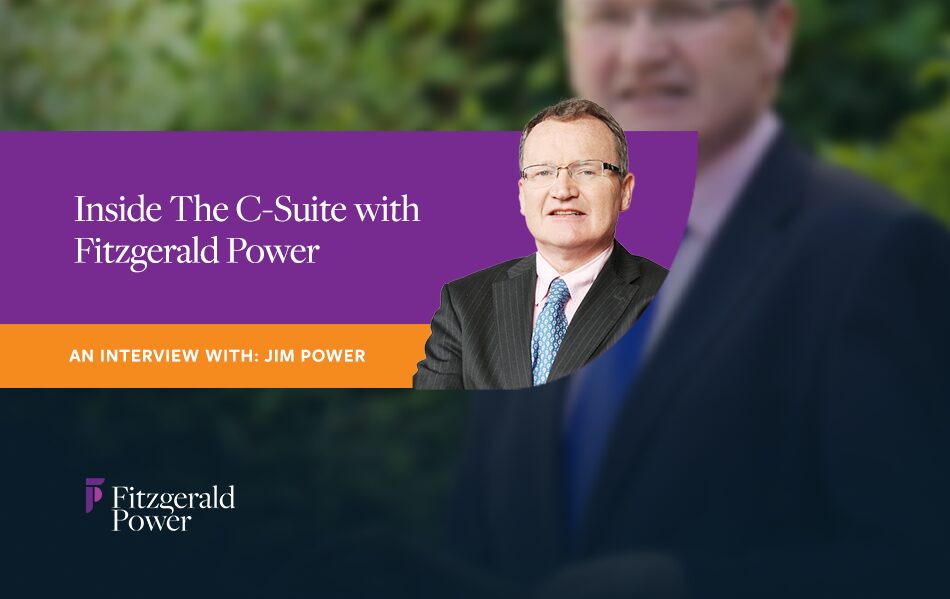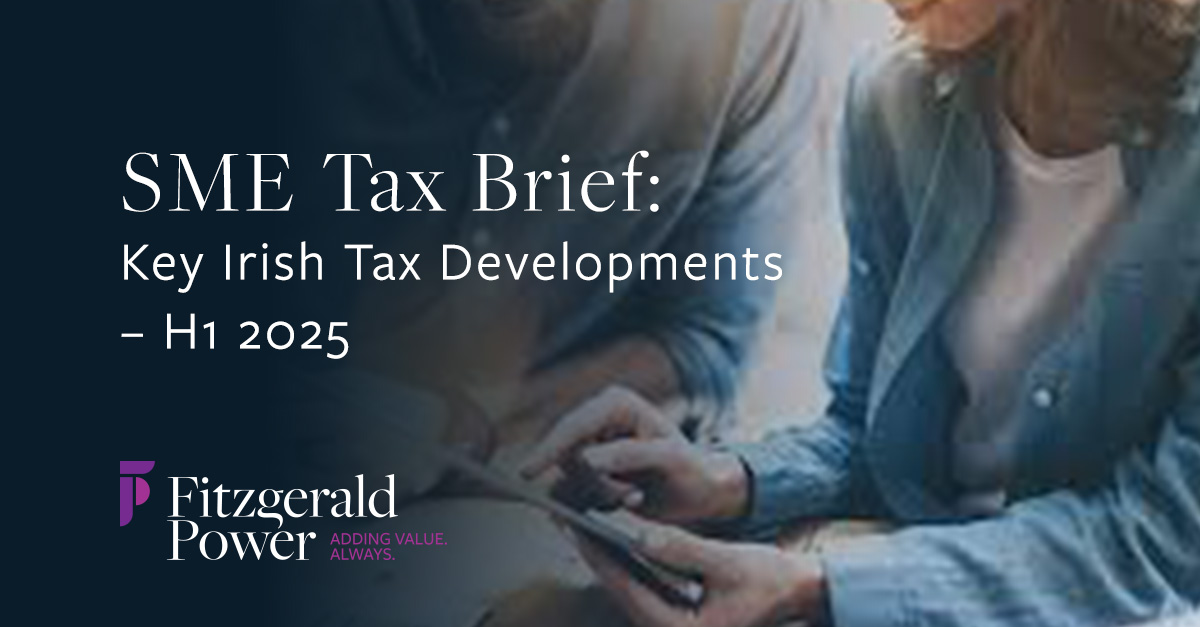“Risk registers are imperative”
In Fitzgerald Power’s interview series, we’re speaking to people with different perspectives who feel they can offer more to the workplace, from the water cooler all the way up to the C-Suite.
Advice based on mathematical form has always proved an irresistible lore. Religion uses the number one to convey a symbol of unity, Sun Tzu’s military counsel in “The Art of War” depends on ratios – “It is the rule in war, if our forces are ten to the enemy’s one, to surround him; if five to one, to attack him; if twice as numerous, to divide our army into two,” – and the 10,000–hour rule insists that anyone with enough time and drive on their hands can become an expert.
Where leaders once turned to druids and sages for number-focused wisdom, such as that listed above, they now turn to the guild of economists. Nowadays, no arena within the settings of public policy – a realm conducted in the language of cost-benefit studies, regulatory-impact analysis, and mathematical models of dazzling complexity – is untouched by economic guidance; economists influence the way that children are schooled, that citizens are housed, that patients are treated, and that criminals are policed. This conquering new style of reasoning, bolstered by the concrete language that is facts and figures, is leading economist Jim Power’s bread and butter. Power grew up on a farm near the Tipperary border in Waterford, where he “fell in love” with Economics at secondary school, De La Salle. “A really good teacher called Fergus Dunne taught me the subject,” he says. “He got us involved in a lot of extra-curricular stuff, which really sparked my interest. Before that, I thought I was going to do science in university because I predominantly did science subjects for the Leaving Cert; Economics was the only exception.”
He left Waterford for UCD at 17, to obtain a Bachelor’s Degree and a Master’s in the subject, something he teaches at the university’s Smurfit Business School today. (Power was in the middle of correcting end-of-semester exams when he took my call.) His other work, of which there is plenty, spans both domestic and international, with an approach towards the sectoral. Indeed, Power works across the agri–food space, as well as construction, motor, pharmacy and botanical industries. “I tend to get involved in as many sectors of the economy as I possibly can,” he smiles. “I believe that in understanding the Irish economy, it is really important to try and understand it from a sector perspective. So it’s very much a bottom–up rather than a top–down approach.”
He, too, is a published author – the most famous of which is his 2009 book “Picking Up the Pieces: Economic Crisis and Hope in Ireland,” which detailed the housing bubble and subsequent recession that exposed the Irish economy “for what it is – unsustainable and reliant on quantity rather than quality in everything from property to health care.” In the book, Power sought to identify the mistakes of the past as an essential step to rectifying them and approaching the future with new ideas. In particular, he wrote that Ireland needs decisive, non-populist leadership with a vision for the long-term economic welfare of Ireland. Does he believe that we have that now? “There are two ways of looking at it,” he smiles. “On one level, the economy has been incredibly successful. We have record levels of employment and an unemployment rate of 4.8%. We have pretty strong public finances. And, the one thing I would say about public finances, and I guess this is in reaction to something that Michael D. Higgins said last May at a tax conference, where he had a go at economists over their obsession with economic activity and their lack of interest in society, my response to him at the time was show me an example of a functioning society that’s not backed up by a functioning economy. I think Ireland has demonstrated that because the strong growth we’ve had in the economy has generated massive tax revenues, and those tax revenues in turn, then facilitate the provision of public services, the payment of social protection and so on. The €14 billion budget that was introduced in October of this year was achieved without having to resort to borrowing. And that’s because we had surpluses on the back of strong economic growth. So the public finance situation is another positive.
“If you look at the Irish export performance, it’s been really strong. If you look at Ireland’s attraction of foreign direct investment, it has also been strong and continues to be strong. So there are many reasons in my view to be pretty upbeat about where Ireland is at. But there are also challenges. To me, socially economically, and politically, housing is the biggest challenge. There’s basically a lack of supply and very strong demand because of our growing population. It doesn’t take a rocket scientist to figure out why that doesn’t work. The other aspect that I would be critical of is the political system that didn’t have the wherewithal to deliver water charges. We need water charges – we need to fund water infrastructure properly. And, you know, the political system backed away from that.
“But, I think there’s more good than bad. One of the things we are blessed with in this country is a pretty stable political system. We have not seen the massive swings in the political cycle like in the UK, which delivered the disaster that is Brexit, or the United States, which delivered Donald Trump. We do have European and local elections in June, and then we have to have a general election before the end of March 2025. If Sinn Féin gets into government, it will represent a fundamental change in the Irish political landscape. And I think, they’d need to be mindful of the fact that having a strong functioning economy that is pro–business that is pro–enterprise that rewards effort and initiative and entrepreneurial endeavour is maintained because if we kill the goose that lays the golden egg… that could certainly do serious damage to the economic model in the longer term.”
Riffing on the political, Power is hellbent on expressing the power democracy has on economics. “Political events have consequences,” Power says. “Look at Argentina, as an extreme example. And that, I guess, is the amber light we need to see flashing as we head into a changing political landscape, looking ahead to 2024. There are a lot of headwinds; there’s no doubt about that. We’ve seen interest rates rise by four and a half per cent since July 2022 – we have yet to see the full impact of those rate increases feeding through the economy, but they will. So that’s one issue.
“Another challenge in the last year and a half has been the escalation in the cost of living. In other words, inflation has taken off, and that’s why central banks have been increasing interest rates. I think the good news is that inflation is coming back under control everywhere. And I think during 2024, the likelihood is that central bankers will eventually start to cut interest rates again. But the immediate challenge for businesses is living with the implications and impact of the rate increases we’ve seen to date. We’re effectively at full employment, in the sense that most people who want to work can actually get a job in this country at the moment. But the challenge for businesses emanating from that is that recruitment and retention of skilled workers is a big challenge. And of course, labour costs are also rising as a consequence of that. And we’re seeing next year, a significant increase in the minimum wage, which you know, will feed through to other wages in the system. And so for businesses, I think 2024 is going to be a more challenging environment. So my advice to businesses would be to plan carefully, manage and identify your risks carefully and create a risk register wherein you identify the risks that you can control. For those you cannot control, make sure you have some sort of mitigation measures in place. That is imperative. And in that regard, I just think that at the end of the day, the secret to success in business is good customer service. Personally, if I have any dealings with a business where I don’t get good customer service, that’s it, never again.”
Come 2024, corporation tax is changing in Ireland. From January 1, as per the Budget, an introduction of the 15% minimum corporation tax rate for multinational entities with global turnover exceeding €750m by way of a domestic top-up tax will come into effect. “That will affect around 60 companies in Ireland,” Power says. “So it is not cataclysmic, but what it does show us is that the tax model we have here is increasingly coming under pressure, and tax as an element of competitive advantage for Ireland is no longer as strong as it was – and it is going to be steadily eroded over the coming years. Our banking system, unfortunately, over the last decade, has reverted to what it was like when I was growing up. It’s basically now dominated by two and a bit banks: AIB, Bank of Ireland and a bit of PTSB. A lack of competition in the banking market is not a good idea. I have argued for quite some time that we should revisit the notion of setting up a dedicated bank with responsibility for the SME sector. And there is a template for that, the old ICC (Industrial Credit Corporation) back in the day. It targets a specific part of the economy, and indeed the ACC (Agricultural Credit Corporation) likewise, but I think we do need to have a bank that basically will look after clients that big banks are not very interested in.”
In terms of sustainability, Power once again insists on the importance of a risk register. “A key part of the risk register today should now be the ESG agenda,” he says. “Some would say it’s just a fad, and that it will go away. It may be a fad, but it’s going nowhere. ESG is now going to become one of the most important drivers of business because there are consumers out there who will only want to do business with companies that have strong ESG credentials. And huge reputational damage can offer if you don’t – look at Volkswagen and their emissions scandal, or Apple with the cobalt sourcing issue. So, I guess from my perspective, the bottom line is that for any business, the strategy has got to feature ESG very, very strongly. And if it doesn’t, you could have huge potential problems down the road.”
At the end of our conversation, with no sign of slowing down, Power’s enthusiasm remains as palpable as ever. Even if he still has twenty exams to correct. The one final nugget he leaves me with, however, is this: “As an economist, one thing I’ve learned is that you can’t forecast the future. There’s nothing certain in the world of economics. And one of the reasons for that is that economic outcomes are driven by human behaviour – and people do not always behave rationally.”
For more information on Jim, his Podcast ‘The Other Hand’ and blog, check out his LinkedIn page here.





